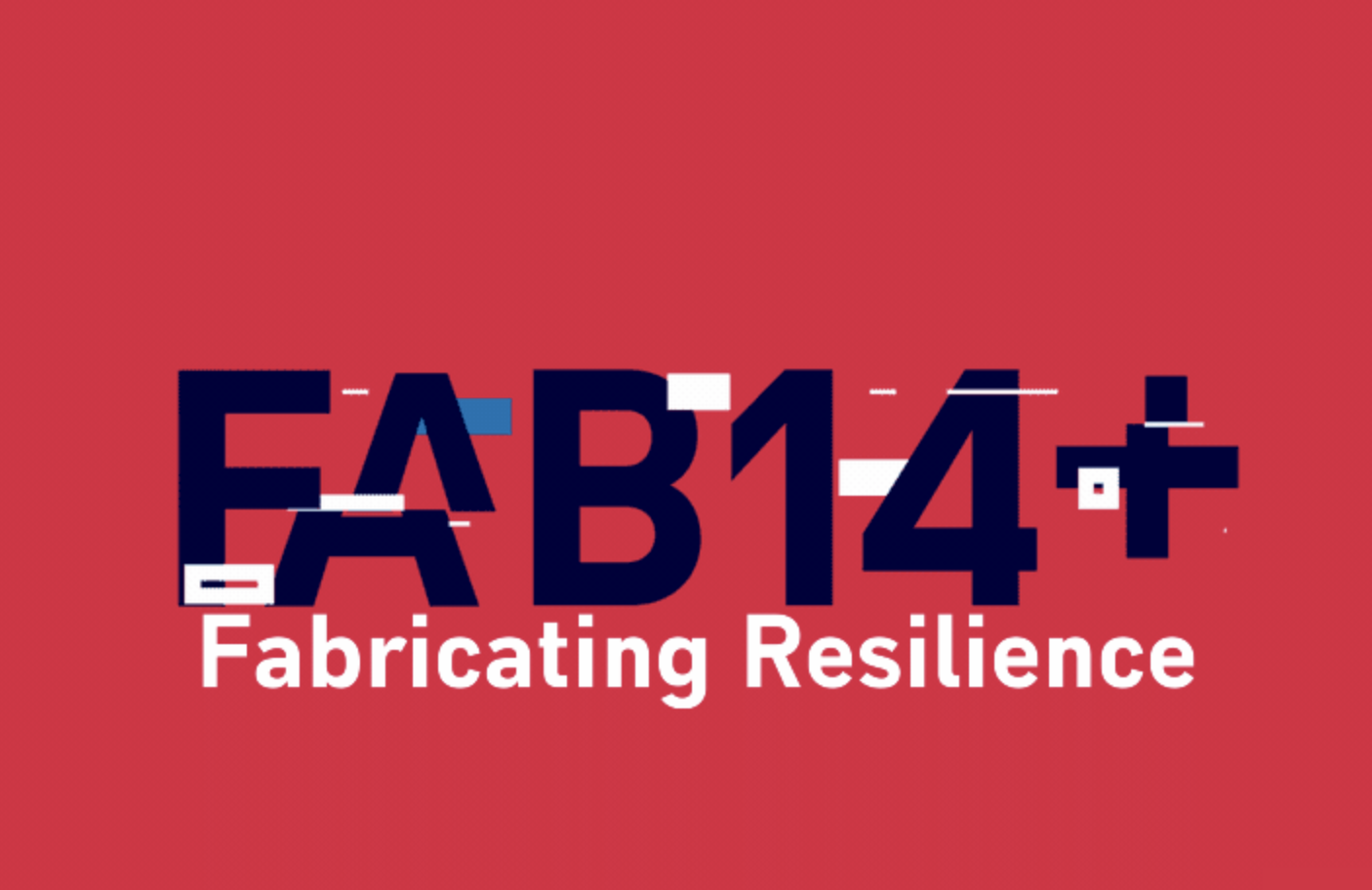My name is Wael Khalil, I am a mechanical engineer and I run the Berytech Fab Lab. I just came back from a very interesting week in France where I joined members of more than 1200 Fab Labs at the FAB14. I am also very proud to announce that I officially graduated the Fab Academy, and the ceremony was held during one of the biggest events dedicated to fabrication laboratories in the world!
Fab14 and a tour de France
On the 14 & 15 of July FAB14 Distributed was happening in 7 different regions of France, each for a particular topic. I joined the Agrofood conference in Albi with the Agrytech Program Manager Fadi Naffah. We had the chance to learn about the different methods of urban food production, and how the Fab Lab can play a major role in its advancement.
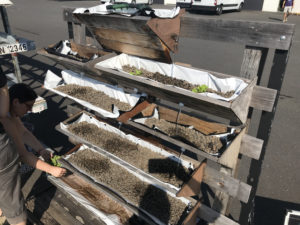
We participated in several mini-conferences and round tables discussing how Fab Labs are helping to create greener, self-sufficient, frugal innovations for food, agriculture and urban farming. Fadi led a talk in how the Fab Lab can activate entrepreneurs to realize breakthrough technologies that can disrupt many businesses. His talk focused on the agriculture sector and how it is being disrupted to cater for the growing need of the world population using technologies such as drones, robotics, IoT, AI and blockchain.
Our stay in Albi was completed by a tour of the local market and visits to the nearby farmers and local vineyard producers, where we were introduced to the different innovative techniques they use to enhance the efficiency and quality of their products.
After Albi, we joined Ramy Boujawde our Deputy General Manager in the FAB14+ main event in Toulouse with “Fabricating Resilience” as the central topic. This event gathered people and makers from the global Fab Lab network to debate, share new ideas and projects, build Fab Lab networks and form a global knowledge network.
Makers and Fabbers!
The conference was truly insightful. We met with makers and Fabbers (you get this cool name if you are part of the Fab Lab network!) from all over the globe, made new contacts, and received advice from professionals who have been in the industry for a long time now. Workshops at the conference covered a wide variety of topics spanning from technical workshops that taught how to build or design a specific product to workshops that shed light on previous experiences of different Fab Labs, including both success stories, mistakes and lessons learned.
Workshops
One workshop discussed how Fab Labs are important to society, industries, and the Fourth Industrial Revolution. Another discussed how governments can take advantage and boost the maker movement in their countries.
Some particularly interesting workshops we attended included:
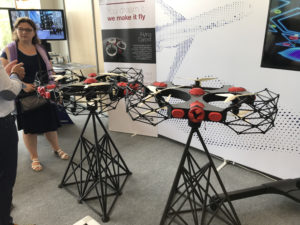
- Rapid prototyping with Printed Electronics – a hands-on session on printed electronics for rapid prototyping wearable and tangible interfaces.
- Projection Mapping with Raspberry Pi – where we learned how to use the Raspberry Pi and the xPiMapper to create interactive, generative and data-driven projection mapping installations.
- Insights and challenges on building communities and sharing networks and a brainstorming session to discuss and find new solutions.
- Designing active learning experiences – this workshop showed us tools, methodologies, and resources used to design active learning experiences for an education STEAM, seeking to inspire and motivate participants to use the possibilities of digital fabrication, coding and makers philosophy to treat any aspect of the curriculum, in addition to implementing methodologies in the classroom oriented towards research and project work.
- Assistive Technologies – how the Fab Lab was used to help produce technologies and products that assist people with physical disabilities. Many customized solutions and equipment could be designed and customized per user to fit the various needs of people who need assistance.
- DIY Soft Sensors – we learned how to make low cost soft sensors (bend, stretch, push, stroke, tilt) in the Fab Lab.
- Learn How to Make your own BioPlastic – this workshop taught us how to DIY craft our own material, in order to achieve the performance intended.
- Fab Lab in a Factory – on discussing how the fab skills are important and useful in a factory, and how you can produce DIY devices for monitoring factory machines.
- Crowdfunding for Fab Labs – discussing how crowdfunding offers the designers, makers and engineers in the fab lab community a unique opportunity to connect with an audience and raise funds to bring their products to life.
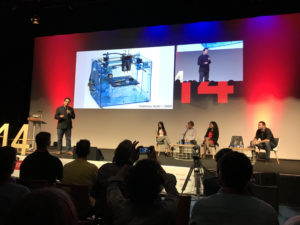
- Public Innovation Labs – how to innovate inside, with, by and for the Government, discussing how governments can effectively boost the maker movement impact not only for citizens, but also for public servants, as the governments are considered to be important stakeholder in developing communities and the main decision makers regarding their governance strategies.
- Fab Lab Management and best practices – sharing know-hows and best practices for running a fab lab. This included the presentation of Fabman, a cloud-based tool used to reduce the work load and increase safety in the fablab.
Learning Outcomes
In short, we learned that the various issues that we face at the Berytech Fab Lab are commonly faced by Fab Labs globally, including sustainability and lack of governmental support. Experts presented their past experiences, showing a list of lessons learned and various models and plans that we can use to make the Fab Lab more sustainable and efficient in the society it is operating in. Most importantly we learned the power of being part of a supportive, collaborative global community.
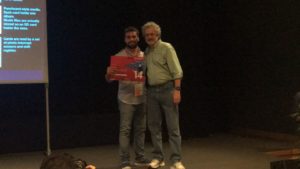
Fab Academy Graduation!
I have to admit that the best moment of the Fab14 was the Fab Academy graduation. I had followed a rigorous 5-month digital fabrication program that the Fab Academy offered to makers in Beirut through the Berytech Fab Lab, part of the international Fab Lab Network. The diploma gives me a great advantage while working at the Berytech Fab Lab, but also the knowledge offered by the course can be applied to any profession requiring rapid prototyping.
Remember that I will be in the Fab Lab to personally assist you in using the lab to create any prototype, in hardware or electronics. If you are a passionate maker, you can join the Berytech Fab Lab and the international Fab Lab community. You can also take your making skills to the next level by joining the next cycle of the Fab Lab Academy.
About the Writer – Wael Khalil
 Wael is a Mechanical Engineer with wide experience in Digital Design & Fabrication. He has a diverse engineering background with valuable experience in the electromechanical industry, including pipe manufacturing and equipment installation for oil & gas and pump station projects. In addition, he is proficient in using most advanced CAD designing tools and programming software available in the market. Wael also has technical experience in operating and controlling a wide range of digital fabrication tools and equipment including but not limited to Laser Cutters, 3D printers, and CNC machines.
Wael is a Mechanical Engineer with wide experience in Digital Design & Fabrication. He has a diverse engineering background with valuable experience in the electromechanical industry, including pipe manufacturing and equipment installation for oil & gas and pump station projects. In addition, he is proficient in using most advanced CAD designing tools and programming software available in the market. Wael also has technical experience in operating and controlling a wide range of digital fabrication tools and equipment including but not limited to Laser Cutters, 3D printers, and CNC machines.


